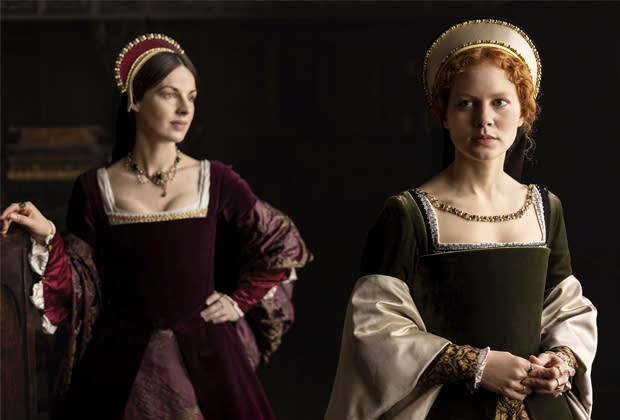Becoming Elizabeth Stars on Exploring Monarch's Teen Years, Inappropriate Thomas Seymour Romance
- Oops!Something went wrong.Please try again later.
- Oops!Something went wrong.Please try again later.
- Oops!Something went wrong.Please try again later.

Becoming Elizabeth, premiering Sunday, June 12 at 9/8c on Starz, tackles relatively unfamiliar territory.
Set during Elizabeth I’s teenage years, the series explores her tumultuous journey in the immediate aftermath of Henry VIII’s death. Elizabeth’s nine-year-old brother Edward (The Romanoffs’ Oliver Zetterström) takes the throne, setting off a dangerous scramble for power with Henry’s surviving children — Elizabeth (Genius’ Alicia von Rittberg), Mary (Suffragette’s Romola Garai) and Edward— caught in the middle.
More from TVLine
Garret Dillahunt Boards Hightown Season 3 as South Boston Gangster
P-Valley Premiere Recap: COVID Hits Chucalissa -- Will The Pynk Survive?
Series creator and writer Anya Reiss was initially hesitant in tackling Elizabeth’s story because she didn’t want to do a “period show with all old white people talking about things that don’t matter; it’s been done a thousand times.” But after talking through the story with executive producer George Ormond (National Treasure), she immediately changed her tune.
“He told me the story and it was like listening to a novella,” Reiss tells TVLine. “It was just so amazing, this bit of history that I had no idea about, and it’s never really been done.”
In the story, Elizabeth doesn’t know what her place in the world is at this point of her life and that creates a cloud of uncertainty around her future. “Her childhood has been really uncertain,” Ormond explains. “Her mother was executed when she was two. Sometimes she’s been Henry VIII’s daughter, sometimes she’s told she is illegitimate.” And upon Henry’s death, “She doesn’t even know where she’s going live, and so she’s spat out into this world.”
As Alicia von Rittberg, who plays Elizabeth, puts it, “She doesn’t know whom to trust. She is completely on her own.
“If she makes a wrong decision, she loses her head,” making for “a dangerous, dark world,” says the actress. “I think that made her the brilliant leader and politician she was, because she learned how to observe [and] take it all in before she jumped to a conclusion. It’s the habit of a survivor.”
Keeping in line with history, Thomas Seymour — Edward’s maternal uncle and the lover of Henry VIII’s widow, Catherine Parr — takes a liking to Elizabeth. Given their stark age difference (she’s 14 and he’s in his late-30s in the show), Reiss worked to ensure the audience understood that this relationship was inappropriate.

“I’m so firmly on, ‘It’s abusive,’” Reiss notes. “It’s a terrible thing that happened to her. But also, we want to tell it through her eyes, and we don’t want to see her as foolish or part of making that decision.”
“I think a lot of women [can look at] an early relationship and go, ‘Oh, that wasn’t good, was it? I thought it was at the time…’” says Reiss. “But probably because I was exercising my own demons a bit, it was kind of like, ‘No, we need to show that he’s a terrible person.’ George [Ormond] was very good at restraining me from that and trying to let things play out how they do. I hope there is room for interpretation within what it is.”
Tom Cullen admits he was afraid to take on the role of Seymour, given the nature of that relationship, but realized that the story wasn’t being told through the courtier’s eyes.
“This is a story about a young woman who is trying to find her place in the world [while] being pulled and pushed around by powerful men, and I’m one of those men,” Cullen explains. “I had to try and make the audience love me in the way that Elizabeth loves Tom — that he is so effervescent, so alive, so fun to be around that you can’t help but be drawn to him. In some ways, the audience is seduced by him alongside Elizabeth.”
Ormond hopes the audience sees the complexity of that dynamic, and that they experience it through Elizabeth’s eyes.
“You definitely feel that [Thomas] is a man who’s charming, who shows real interest in Elizabeth and listens to her,” says the EP. “He has real conversations where he’s not just trying to maneuver into a political position, and she does fall for him. But it’s inappropriate because he’s encouraging that and drawing her closer to him. It felt like a really interesting thing to explore, the fact that Elizabeth was blamed for this relationship.”
That said, Ormond never wanted it to feel like the audience was “15 steps ahead of her and [thinking] she’s being really stupid, ‘Why can’t she see what we can see?’ It was an interesting balance between understanding what she feels for him, and also worrying for her and letting the story unfold.”
Best of TVLine
Get more from TVLine.com: Follow us on Twitter, Facebook, Newsletter

